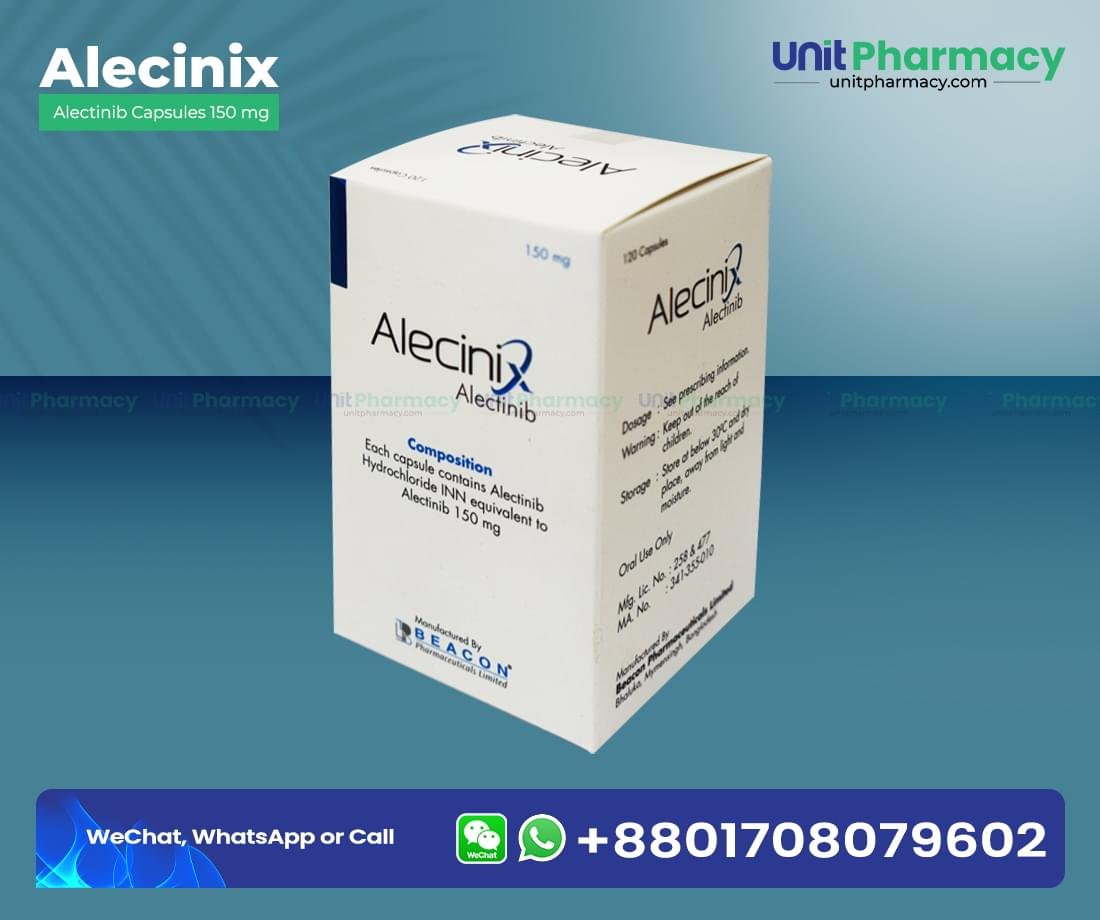Alecinix 150 Mg (Alectinib price)
Alecinix 150 mg is a part of kinase inhibitor. And Its main ingredient is Alectinib and it is approved for the treatment of adult patients with ALK-positive advanced non-small cell lung cancer (NSCLC). This drug is recommended for those patients who have not responded to or can not tolerate Crizotinib. Also alecinix target specific protein in cancer cell to block or stop the growth of cancer cell.
Product Details
- Product Name: Alecinix
- Generic Name: Alectinib
- Formulation: Capsule
- Available Pack Size: 60 capsules per pot
- Strength: 150 mg
- Registrations: Export only
Each Alecinix 150 mg (Alectinib Price) capsule contains Alectinib Hydrochloride equivalent to 150 mg of Alectinib, ensuring consistent and precise dosing for effective treatment…..
Alectinib Mechanism of Action of
Alecinix 150 mg is a kinase inhibitor that targets ALK and RET proteins. In nonclinical studies, Alectinib inhibited ALK phosphorylation and ALK-mediated activation of downstream signaling proteins such as STAT3 and AKT.
Alecinix 150 mg (Alectinib Price)
Price: $1100.00
Quantity: 60 Tablets
Alectinib Dose & Administration
Alectinib Dose, Adults typically take 600 mg of this medication orally twice daily with food until their condition worsens or side effects become unacceptable.
Key Considerations
Doctors should choose patients for treating metastatic non-small cell lung cancer (NSCLC) based on ALK positivity in tumor tissue or plasma samples. If ALK rearrangements are not found in plasma, doctors should test tumor tissue if possible.
Usage: This drug is used to treat ALK-positive metastatic NSCLC, as confirmed by an FDA-approved test.
Adjustments for Kidney Function:
- Mild (CrCl 60 to <90 mL/min) or moderate (CrCl 30 to <60 mL/min) renal impairment: No dose adjustment is necessary.
- Severe renal impairment (CrCl <30 mL/min) or end-stage renal disease: Data is unavailable.
For Grade 3 renal impairment: Pause treatment until recovery to baseline or to 1.5 times the upper limit of normal (ULN) or less, then resume at a reduced dose. For Grade 4 renal impairment: Stop therapy permanently.
Adjustments for Liver Function:
- Mild (Child-Pugh A) or moderate (Child-Pugh B) hepatic dysfunction: No dose adjustment is needed.
- Severe hepatic dysfunction (Child-Pugh C): Reduce the dose to 450 mg orally twice daily.
Fristly, If ALT or AST levels are more than 5 times the ULN with total bilirubin 2 times ULN or less: Temporarily stop treatment until recovery to baseline or to 3 times ULN or less, then resume at a reduced dose.
Secondly, ALT or AST levels more than 3 times ULN with total bilirubin levels more than 2 times ULN in the absence of cholestasis or hemolysis: Discontinue therapy permanently. Total bilirubin levels more than 3 times ULN: Pause treatment until recovery to baseline or to 1.5 times ULN or less, then resume at a reduced dose.
Especially Check up every two weeks for the first two months of treatment
Dose Adjustments
- Starting dose: 600 mg orally twice daily
- First reduction: 450 mg orally twice daily
- Second reduction: 300 mg orally twice daily
- If 300 mg twice daily is not tolerated, discontinue therapy.
Alectinib 150 mg Side Effects
Common Alecinix 150 mg Side Effects
(More than 10% of patients):
- Anemia (56%)
- Increased AST (51%)
- Increased alkaline phosphatase (47%)
- Increased CPK (43%)
- Fatigue (26-41%)
- Hyperbilirubinemia (39%)
- Hyperglycemia (36%)
- Increased ALT (34%)
- Constipation (34%)
- Hypocalcemia (32%)
- Edema (22-30%)
- Hypokalemia (29%)
- Myalgia (23-29%)
- Increased creatinine (28%)
- Lymphopenia (22%)
- Hypophosphatemia (21%)
- Hyponatremia (20%)
- Cough (19%)
- Rash (15-18%)
- Nausea (14-18%)
- Headache (17%)
- Diarrhea (12-16%)
- Dyspnea (16%)
- Back pain (12%)
- Vomiting (7-12%)
- Bradycardia (11%)
- Increased weight (11%)
Less Common Side Effect (1-10% of patients):
- Vision disorder (10%)
Less Common Side Effect (Grade 3 or 4):
- Increased ALT (4.8%)
- Increased CPK (4.6%)
- Lymphopenia (4.6%)
- Vision disorders (4.6%)
- Hypokalemia (4%)
- Renal impairment (3.9%)
- Dyspnea (3.6%)
- Increased AST (3.6%)
- Dysgeusia (3.3%)
- Hypophosphatemia (2.8%)
- Hyperbilirubinemia (2.4%)
- Hyperglycemia (2%)
- Hyponatremia (2%)
- Anemia (2%)
- Fatigue (1.2%)
- Myalgia (1.2%)
- Diarrhea (1.2%)
- Increased alkaline phosphatase (1.2%)
Very Rare (<1% of patients, Grade 3 or 4):
- Edema (0.7-0.8%)
- Headache (0.8%)
- Rash (0.4-0.7%)
- Dysgeusia (0.7%)
- Nausea (0.7%)
- Vomiting (0.4%)
- Increased weight (0.4%)
- Hypocalcemia (0.4%)
Warnings and Precautions
After starting Alecinix 150 mg treatment It is crucial to regularly check liver functions. So regularly check your heart rate and blood pressure and monitor continuously any worsening respiratory symptoms.
If you feel a breathing problem, please immediately go and check. You have to stop this treatment immediately, if you have a condition like interstitial lung disease or pneumonitis is diagnosed. If a patient feels any unexpected muscle pain, weakness or tenderness, then report to your doctor. Alectinib may be the cause of harm to the fetus.
If you know about Tofacitinib
Alternative Generic Options
Alecinix 150 Mg (Alectinib) Capsules - Online Worldwide
Alecinix 150 Mg (Alectinib) is used to treat adults with anaplastic lymphoma kinase (ALK)-positive advanced non-small cell lung cancer (NSCLC).
Product Brand: Alecinix 150 Mg
Product Currency: USD
Product Price: 1,110
Product In-Stock: InStock

Reviews
There are no reviews yet.